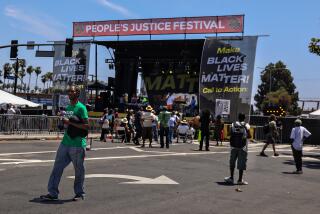Anti-Apartheid Group Disbanding in August : South Africa: The UDF alliance, which united some 700 organizations, says its goals have been met. Many key figures have become ANC leaders.
- Share via
JOHANNESBURG, South Africa — A historic era in the black liberation movement came to a close Monday when the United Democratic Front, the combative 2-million-member anti-apartheid coalition that the government had spent most of the 1980s trying to silence, announced plans to disband.
UDF leaders said that the multiracial umbrella organization for some 700 groups, from civic associations to church groups, had fulfilled the goals it set for itself when it was formed in 1983.
Among those goals, President Albertina Sisulu said, was the release of Nelson Mandela and other liberation leaders, the free return of political exiles and the legalization of dissident groups such as the African National Congress.
“The government has begun the search for a negotiated settlement with the majority of South Africa’s people,” Sisulu told a news conference. In light of that, she said, the UDF would be formally disbanded in August.
“While it’s sad that an organization as strong as the UDF has had to leave, we also have a very strong sense of victory--that the struggle we have waged has not been in vain,” said Azhar Cachalia, a Johannesburg attorney and UDF treasurer.
But UDF leaders urged member organizations to remain politically independent and to continue their work on grass-roots issues to keep a critical eye on the next South African government.
“Even when the ANC becomes the government, there will always be a need to check whether government policies address community needs,” said Patrick Lekota, the UDF publicity secretary and now an ANC organizer. “The ANC would value that.”
The UDF was formed specifically to protest government plans to set up separate but less powerful houses for mixed-race coloreds and Indians in what was then an all-white Parliament. The 28 million blacks have no representation in the tricameral Parliament.
With all other anti-apartheid groups outlawed at the time, though, the UDF quickly expanded its goals and began a long-running battle with the security police.
During the mid-1980s, the state detained many UDF leaders for months without trial and placed severe restrictions on the movements and activities of others. The UDF itself was banned twice from engaging in political activities.
Both Sisulu and Cachalia spent most of the 1980s under police restrictions that prevented them from granting interviews, speaking to groups of people or leaving the Johannesburg area without permission.
Five UDF leaders--including Lekota and UDF General Secretary Popo Molefe--were convicted of treason in 1988 by a judge who ruled that the UDF was the internal wing of the ANC and had plotted to make the country ungovernable. Lekota, Molefe and Moss Chikane, a UDF official in the Transvaal Province, spent four years in jail before all the convictions were overturned on appeal.
The UDF’s future has been in question since February, 1990, when President Frederik W. de Klerk legalized the ANC and all other banned anti-apartheid organizations. The UDF was, in fact, a close ally of the ANC, and many key UDF figures have become leaders in the ANC in the past year.
But not everyone in the UDF was an ANC supporter, and some had criticized the ANC for being out of touch with everyday South Africans. Facing a difficult decision over whether to join the ANC, disband or continue as a separate organization, a UDF conference over the weekend chose to disband.
Elsewhere in South Africa on Monday, police said that 24 blacks were killed in internecine fighting between Zulus and Xhosas in a workers’ dormitory in Soweto on Sunday. Police said the trouble began when a Zulu man was killed on Friday. A Johannesburg newspaper reported, however, that the fighting began when a Zulu man demanded that Xhosas remove their pro-ANC T-shirts.
Factional violence in Soweto and other Johannesburg-area townships has claimed nearly 1,000 lives since August, and much of the trouble has been fanned by disputes between Zulu supporters of the Inkatha Freedom Party and other supporters of the ANC. But the fighting has died down considerably in the five weeks since the ANC’s Mandela and Inkatha’s Mangosuthu Gatsha Buthelezi jointly called on their followers to stop killing each other.
More to Read
Sign up for Essential California
The most important California stories and recommendations in your inbox every morning.
You may occasionally receive promotional content from the Los Angeles Times.














